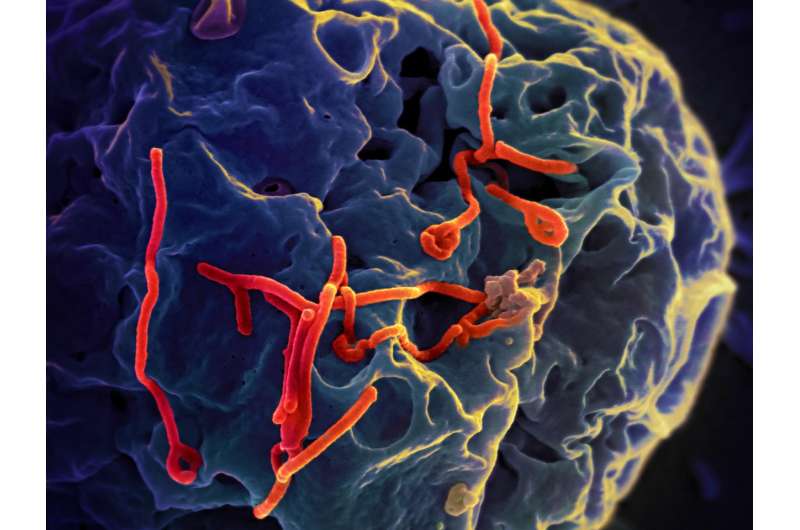Ebola contained by 'complex' rapid response, not just vaccine: WHO

The World Health Organization has a message for those trying to understand how the latest Ebola outbreak was contained so quickly: don't give the new vaccine all the credit.
Compared to the 2013-2015 West African outbreak, which exploded into an epidemic that killed more than 11,300 people, the response to the latest flareup of the virus in the Democratic Republic of Congo was a clear success.
In an interview with AFP, WHO's deputy chief for emergency response Mike Ryan conceded that the new vaccine deployed in DRC was "a fantastic tool", but "we can't say (it) made the difference."
He instead highlighted factors like the fast local and international response as well as "painful lessons" learnt after WHO's severely criticised handling of the West African epidemic, which plunged the UN agency into an existential crisis, according to public health experts.
Data analysis in the coming weeks will clarify the role played by the rVSV-ZEBOV vaccine in stemming the outbreak that stretched from May 8 to July 24 and claimed 33 lives, according to Kinshasa.
"At this point I can only say that (the vaccine) probably played a part, but it was a small part in a very sophisticated and complex response," Ryan added.
What went right?
For Ryan, quick reaction was the key.
"The main reason we were faster, quicker and more effective this time was that we launched a response very, very early.
"We investigated early, we responded aggressively, we isolated cases quickly, we put in place excellent contact tracing and then in addition to that we were able to vaccinate contacts," he said.
That swift reaction in a remote part of northeastern DRC marked a stark contrast to the West African epidemic, when WHO's former chief Margaret Chan was accused of failing to sound an early global alarm about an impending catastrophe.
"WHO has learnt a lot from the last outbreak, a lot of painful lessons," Ryan said.
'Hope not death'
More than 3,300 people in DRC's affected Bikoro region were vaccinated, but Ryan said that entering communities with a vaccine had advantages beyond prophylactic defences against Ebola.
"The fact that we were bringing vaccines to communities meant we were bringing hope not death," he said.
"So people were rushing forward saying 'can we be vaccinated' and that changes the dynamic because the communities now sense that the international community is bringing in salvation, not the end of the world."
Health responders were at times attacked amid the height of the West African epidemic and a more cooperative population inevitably makes it easier to trace contacts and identify patients.
"I certainly think the local communities in this Ebola response were highly receptive to the intervention, more so maybe than in West Africa," Ryan said.
Overall, the successful DRC response served as another reminder for WHO that travel restrictions do not work.
He called such measures "a highly expensive and a highly ineffective way of containing disease."
He pointed to Congo River, which in the latest outbreak risked becoming a route through which sick patients might spread the virus throughout DRC and beyond.
But WHO and the Congolese government opted for screening and sensitisation along the river, rather than movement restrictions.
The river, he said, "is the lifeblood of the country. This is the economic highway... Are we going to block (this) the vital economic artery?"
Ebola: Previous outbreaks
As the Democratic Republic of Congo (DRC) declares that the latest epidemic of Ebola is officially over, here is a recap of previous major outbreaks of the disease:
1976: First known outbreak
Ebola was first identified in central Africa in 1976 and named after a river in northern DRC, then known as Zaire.
It claimed 431 lives that year: 280 in the DRC and 151 across the border in Sudan, in an area that is today part of South Sudan, according to the US Centers for Disease Control (CDC).
Three years later the virus re-emerged in the same region of southern Sudan, killing 22.
1995: Congo again
In May 1995 Ebola struck again in the DRC, in the forested region of Kikwit in its southwest. It spread quickly and lethally, killing 250 people from 315 reported cases.
2000-2001: Uganda
In September 2000 the Sudan strain of Ebola spread for the first time to Uganda, infecting 425 people in the northern and western regions, of whom 224 died.
2001-2003: Gabon, Congo
Affected by the Zaire strain of Ebola on three occasions between 1994 and 1997 with nearly 100 people dying in total, Gabon saw a sudden rise in cases between October 2001 and May 2002.
The epidemic hit the province of Ogooue-Ivindo in the northeast, an area which had previously been infected. Fifty-three of 65 people reported to have caught the virus eventually died.
It spread to the Republic of Congo, DRC's neighbour, where it killed 43 in 2001 and more than 150 over 2003.
2013-2015: deadliest
The deadliest epidemic of Ebola broke out in West Africa in December 2013 and lasted more than two years, killing more than 11,300 of the 29,000 recorded cases.
Around 99 percent of the victims came from three neighbouring countries. In Guinea, where the epidemic started, more than 2,500 died, while in Sierra Leone more than 3,900 perished and Liberia lost around 4,800 people.
This toll, which the WHO says is an underestimate, was seven times the total number of deaths in previous epidemics since the virus was identified.
2018: DRC's ninth outbreak
This year's outbreak in the DRC was the ninth in the country since 1976.
The latest episode, publicly declared on May 8, resulted in 33 deaths, according to DRC health authorities.
It was first recorded in the Bikoro area in remote Equateur province before spreading to the city of Mbandaka.
The virus previously killed 187 people in the country in 2007 and 43 in 2012.
© 2018 AFP


















